Subject – Science (English Medium)
General Instructions :
i) The question-cum-answer booklet contains two Groups, Group – I & Group – II.
ii) Group – I contains two Parts, Part – A & Part- B and Group – II contains two Parts, Part – C & Part – D.
iii) In Group – I, Part – A consists of 39 questions and Part – B consists of 11 questions. In Group – II, Part – C consists of 21 questions and Part – D consists of 6 questions.
iv) Space has been provided in the question-cum-answer booklet itself to answer the questions.
v) Follow the instructions given in Part – A of Group – I and Part – C of Group – II and write the correct answer in full in the space provided below each question.
vi) For Part – B of Group – I and Part – D of Group – II enough space for each question is provided. You have to answer the questions in the space provided.
vii) Space for Rough Work has been printed and provided at the bottom of each page except Page No. 32.
GROUP - I
( Physics & Chemistry )
( Marks : 65 )
PART - A
Four alternatives are given for each of the following questions / incomplete statements. Only one of them is correct or most appropriate. Choose the most appropriate alternative and write it in the space provided below each question.
(39 × 1 = 39)
1. North pole of a bar magnet is continuously thrust in and pulled out of the coil of conductor connected to a galvanometer several times, then the pointer of the galvanometer
(A) remains at zero
(B) deflects on either side of the zero
(C) moves towards the left side of the zero
(D) deflects towards the right side of the zero.
2. A cyclist riding a cycle fitted with a dynamo to a tyre gets bright light in the bulb connected, when he pedals fast. This is because,
(A) magnet becomes powerful, when wheel rotates faster and current flows fast
(B) current flows easily when cycle goes fast
(C) more magnetic lines of force change with respect to the coil and leading to more current
(D) coil becomes hot due to friction and produces more current.
3. A person wrongly uses infrared rays to detect a flaw in a machine part. The correct radiation he should be using is,
(A) X-ray
(B) ultra-violet ray
(C) micro-wave
(D) visible light.
4. The frequency of a radiowave, having a wavelength of 300 m is
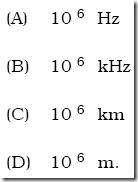
5. Which of the following indicates forward biasing ?
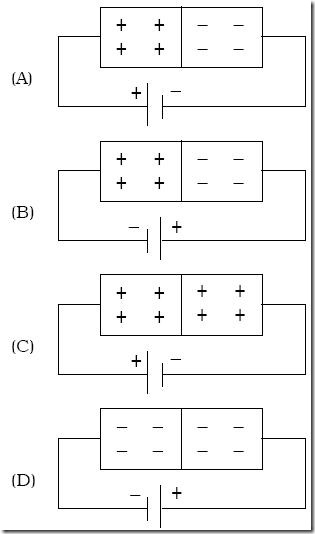
6. To convert the incomplete diagram into npn transistor symbol, the direction of the arrow mark should be from
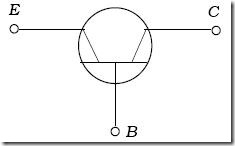
(A) B to C (B) C to B
(C) E to B (D) B to E.
7. In the radio transmission the process of superimposing A.F. signals on R.F. wave is called
(A) modulation
(B) demodulation
(C) rectification
(D) amplification.
8. Which one of the following is an application of centrifugal reaction ?
(A) Separating butter from curds with a churner
(B) Separation of petroleum products
(C) Concentration of haematite ore
(D) Drying clothes in sun.
9. If a string whirling with a stone snaps, then the motion of the stone will be
(A) in the direction of the circular motion
(B) towards the centre of the circular path
(C) tangential to the circular path
(D) opposite to the direction of the circular path.
10. If the distance between two heavenly bodies increases by two times then the gravitational force between them
(A) decreases by 4 times (B) increases by 4 times
(C) decreases by 12 time (D) increases by 2 times.
11. Which one of the following is true if an object is falling freely under gravity ?
(A) Its mass decreases
(B) It experiences weightlessness
(C) Its weight increases
(D) Its mass becomes zero.
12. Rayleigh scattering of light is called coherent because
(A) there is change in the wavelength of light
(B) there is change in the frequency of light
(C) there is no change in the wavelength of light
(D) there is change in both frequency and wavelength of light.
13. While studying Raman effect, a person uses light from the fluorescent lamp. To correct this mistake, he must use light from the source,
(A) tungsten filament lamp
(B) sun
(C) sunlight passed through a lens
(D) monochromatic sodium vapour lamp.
14. Rainbow is an example for the spectrum of the type
(A) pure (B) impure
(C) line emission (D) line absorption.
15. Ultrasound signal sent by a sonar situated at the surface of ocean takes 6 seconds to return from the floor of the ocean. The depth of the ocean floor is
(A) 4·5 km (B) 0·45 km
(C) 9·5 km (D) 45 km.
16. The radar gun used by traffic police to detect the overspeeding vehicles, works on the principle of Doppler effect. The wave used is
(A) Radiowave
(B) Soundwave
(C) Visible light
(D) Ultrasonic.
17. The colour of the star having highest temperature is
(A) red
(B) yellow
(C) yellowish white
(D) bluish white.
18. Relatively low temperature regions on the surface of the sun are caused by
(A) magnetic activities below photosphere
(B) thermonuclear fusion reaction
(C) nuclear fission reaction
(D) ionisation of gases.
19. In the evolution of stars, heavy elements like iron are formed during the stage,
(A) Protostar
(B) Red giant
(C) Steady state
(D) Supernova.
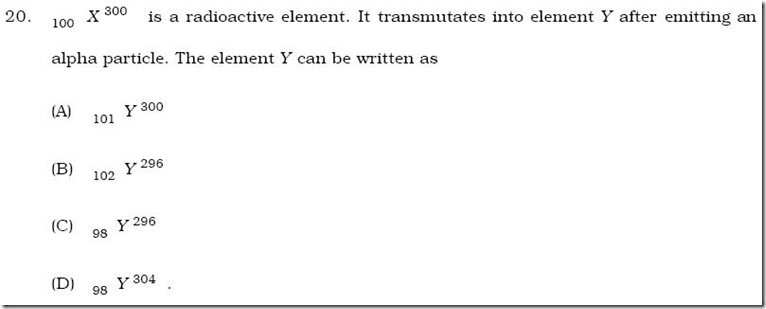
21. The moderator in a nuclear plant is usually made of
(A) graphite (B) cadmium
(C) water (D) sodium.
22. Radiation hazard may cause the disease,
(A) Leukemia (B) Cholera
(C) Typhoid (D) Night blindness.
23. In a solar water heater the copper pipe is painted black because it helps
(A) in better absorption of light
(B) to prevent corrosion
(C) to radiate heat to the surrounding
(D) in the absorption of heat by water.
24. The reason for the enormous output of energy from the sun is
(A) combustion of hydrogen gas
(B) fission of helium nuclei
(C) fusion of hydrogen nuclei
(D) friction between hydrogen atoms.
25. Which one of the following is a method of increasing the weight of the body on earth without changing the mass ?
(A) Taking the body to the poles
(B) Powdering the body
(C) Cooling it below 0°C
(D) Magnetising the body.
26. Now-a-days people prefer to use compact fluorescent tube more because
(A) they can be easily produced
(B) they save electrical energy
(C) they are produced in the small scale industries
(D) they give more light with less heat.
27. Which of the following ores is a carbonate ore of iron ?
(A) Haematite
(B) Magnetite
(C) Limonite
(D) Siderite.
28. The best combination of metal and an acid to prepare hydrogen gas is
(A) copper and nitric acid
(B) copper and dilute hydrochloric acid
(C) zinc and dilute hydrochloric acid
(D) copper and dilute sulphuric acid.
29. In the extraction of amorphous silicon, magnesium is used as a reducing agent. The product is washed with hydrofluoric acid, to remove
(A) extra magnesium (B) unchanged silica
(C) amorphous silicon (D) extra quartz.
30. Though silicon is a non-metal, when warmed it becomes a semiconductor due to
(A) electrons released by breaking of covalent bonds
(B) electrons released by breaking of ionic bonds
(C) movement of electrons of innermost orbitals
(D) formation of covalent bonds.
31. The correct structural formula of propene in the following is
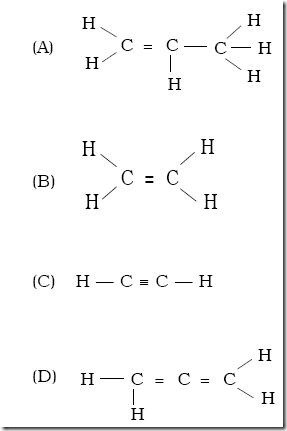
32. An officer during an emission test on a car, detects more than 10% of carbon monoxide. This could be due to
(A) the quantity of oxygen supplied is more
(B) heat released is more
(C) complete combustion of fuel
(D) incomplete combustion of fuel.
33. A benzene ring structure could be changed to toluene by
(A) adding CH3 group
(B) replacing H by CH3 group
(C) replacing H by CH group
(D) adding NO2 group.
34. A manufacturer of cooking utensils wants to fix plastic handles to them. The plastic he can select is
(A) PVC (B) Polythene
(C) Bakelite (D) Nylon.
35. The gaseous product released during the manufacturing of soda glass is
(A) Carbon dioxide
(B) Sulphur dioxide
(C) Nitrogen dioxide
(D) Nitric oxide.
36. Cement containing higher percentage of gypsum than required,
(A) sets slowly (B) sets rapidly
(C) does not set at all (D) gets higher strength.
37. The ion which can be removed by Permutit process is
(A) Lead (B) Calcium
(C) Iron (D) Manganese.
38. The by-product of the process of saponification is
(A) Methanol (B) Glycol
(C) Glycerol (D) Sodium hydroxide.
39. In the process of preparation of detergents, the organic acids produced are
neutralized with
(A) sodium hydroxide (B) sodium sulphate
(C) sodium chloride (D) sodium nitrate.
40. Draw a neat sketch of the graphs showing the direction of the induced current in both A.C. and D.C. dynamos. 2
41. Draw a neat sketch of a single stage rocket. 2
42. What are geo-stationary satellites ? Write any one use of geo-stationary satellites. At what height should they be located ? 2
43. What is a galaxy ? Mention the types of galaxies. 2
44. Write the structural formulae of Isobutane and Cyclohexane. 1 + 1
45. During beta decay of a radioactive element, what changes take place in the nucleus of an atom ? Represent the changes taking place in the transmutation of radio carbon by beta emission. 2
46. Give one reason for each of the following :
a) Fissionable material should have certain critical size. 1
b) People working in nuclear power station wear lead jackets. 1
47. Softening of hard water by boiling is easiest, yet we need to consider other methods of softening. Why ? 2
48. Write any two differences between laser light and ordinary light. 2
49. Draw a neat diagram of a blast furnace. 4
50. In a petrol engine write a function for each of the following :
i) Crankshaft : 1
ii) Carburettor : 1
iii) Spark plug : 1
iv) Inlet valve : 1
GROUP - II
( Biology )
( Marks : 35 )
PART - C
Four alternatives are given for each of the following questions / incomplete statements. Only one of them is correct or most appropriate. Choose the most appropriate alternative and write it in the space provided below each question.
21 × 1 = 21
51. The plant that possesses Reticulate Venation is
(A) Paddy (B) Mustard
(C) Ragi (D) Jowar.
52. An example for Pteridophyta is
(A) Adiantum (B) Funaria
(C) Riccia (D) Marchantia.
53. The number of chambers in the heart of tortoise is
(A) two (B) three
(C) four (D) five.
54. The type of epithelial tissue found in the inner layer of the small intestine is
(A) Squamous epithelium
(B) Columnar epithelium
(C) Ciliated epithelium
(D) Cuboidal epithelium.
55. Meristematic tissue is not found in
(A) Bark
(B) Root tip
(C) Stem apex
(D) Buds.
56. The tissue which gives shape, support, protection and helps in movement is
(A) Epithelial tissue
(B) Muscular tissue
(C) Bone tissue
(D) Nervous tissue.
57. In nervous system, spinal nerves are the basic components of
(A) central nervous system
(B) peripheral nervous system
(C) sympathetic system
(D) para-sympathetic system.
58. The excess secretion of growth hormone in adults causes
(A) Acromegaly
(B) Gigantism
(C) Dwarfism
(D) Cretinism.
59. The part of the inner ear, concerned with balancing of the body is
(A) Utriculus
(B) Sacculus
(C) Cochlea
(D) Organ of Corti.
60. HIV is covered with double layered membrane which is made up of
(A) Carbohydrates
(B) Fats
(C) Proteins
(D) Minerals.
61. HIV is transmitted by
(A) sharing food with AIDS patient
(B) shaking hands with AIDS patient
(C) using common toilets
(D) sharing unsterilized syringes used by AIDS patient.
62. The part of the digestive system which is affected by Hepatitis-B, is
(A) Stomach
(B) Pancreas
(C) Intestine
(D) Liver.
63. Food adulteration means
(A) weighing less quantity
(B) adding substances of inferior quality
(C) adding more vital components
(D) weighing with polythene cover.
64. Which is an accidental adulteration ?
(A) Stones in rice
(B) Talcum powder in wheat flour
(C) Jaggery in honey
(D) Vegetables with traces of insecticides.
65. The common adulterant found in Red Chilli powder is
(A) coloured saw dust
(B) used tea powder
(C) metanil yellow
(D) papaya seeds powder.
66. A biotic component of environment is
(A) Bacteria
(B) Water
(C) Air
(D) Soil.
67. The organism that does not involve directly in the fixation of nitrogen, is
(A) Anabaena
(B) Diatom
(C) Nostoc
(D) Leguminous plant.
68. The gaseous pollutant, more responsible for acid rain, is
(A) sulphur dioxide
(B) carbon dioxide
(C) carbon monoxide
(D) nitrogen oxide.
69. The biodegradable pollutant is
(A) DDT (B) glass
(C) wood (D) plastic.
70. The world’s first clone is
(A) Sheep
(B) Hen
(C) Cow
(D) Buffalo.
71. The type of Biotechnology applied in Forensic Science is
(A) Genetic Engineering
(B) DNA fingerprint technology
(C) Tissue culture
(D) Cloning.
PART - D
Instructions : i) Answer the following questions.
ii) Write the answers in brief according to the questions.
72. Draw a neat diagram of root system in monocot plant. 2
73. Name the protein that gives red colour to the blood. What is its function ? 2
74. After relay race, Runner-A, pours glucose powder into his mouth. Runner-B tastes the glucose slowly with tip of his tongue. Whom do you think, experiences the sweetness most ? Why ? 2
75. Nowadays birds are decreasing in thickly populated area. Give two reasons. 2
76. Mention two pollutants, which pollute public water sources in rural areas. 2
77. Draw a neat diagram of vertical section of human eye. Label Cornea and Choroid. 4
Answer Key
1. B 2. C 3. A 4. A 5. A
6. D 7.A 8. A 9. C 10. A
11. B 12. C 13. D 14. B 15. A
16. A 17. D 18. A 19. D 20. C
21. A 22. A 23. D 24. C 25. A
26. D 27. D 28. C 29. B 30. A
31. A 32. C 33. B 34. C 35. A
36. B 37. B 38. C 39. A
51. B 52. A 53. B 54. B 55. A
56. C 57. B 58. A 59. A 60. B
61. D 62. D 63. B 64. D 65. A
66. A 67. B 68. A 69. C 70. A
71. B
73. i) Haemoglobin
ii) Supplies oxygen to every cell in the body
Remove carbon dioxide from the cells and transport it to the lungs.